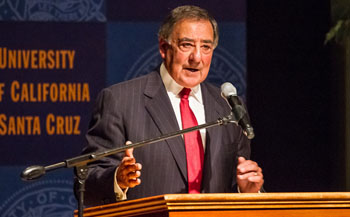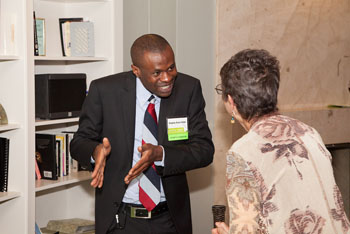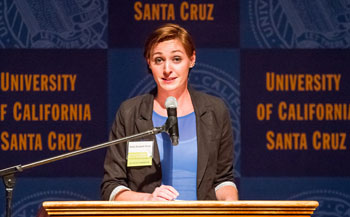Former Secretary of Defense Leon Panetta fired up a crowd of 275 people with shout-outs for ingenuity and "real grit," jabs at congressional gridlock, and a strong emphasis on education during his keynote address at "Launch! A celebration of the UCSC student experience" on Friday evening, featuring a dinner and exhibitions of student work.
The festivities, held at University Center, focused squarely on hands-on immersive learning, a key initiative of the Campaign for UC Santa Cruz, a $300 million fundraising effort to provide critical resources to help students and faculty pursue their projects.
Capping an evening that demonstrated hands-on learning, ingenuity, and the importance of critical thinking, Panetta shared tales from his years as a congressman representing California’s Central Coast from 1977 to 1993 and from his time as director of the Central Intelligence Agency from 2009 to 2011. Referring to the words of Laszlo Bock, the senior vice president of people operations for Google – responsible for Google hiring -- he cited the importance of “rigor in your thinking, the guts to take on a more challenging course load, and not taking the easy way out.”
The cognitive ability to assimilate new information and solve problems is “exactly what we need to govern the nation, Panetta remarked. “As I often tell students, we either govern by leadership or by crisis.”
Aims at gridlock
Panetta took aim at government gridlock. “In 2014, 100 years after World War I–the war to end all wars’–our democracy is being tested by gridlock here at home,” he said. “In my 50 years of public service I have seen Washington at its best and worst, but have never seen Washington as partisan and divided as it is today.
After putting some of the blame on powerful lobbyists and political action committees, well as redistricting that has produced “safe Democratic and Republican seats” and enabled candidates to “play to extremes” with fewer political repercussions, he cited a long list of pressing problems that are not being addressed: among them, immigration reform, long-term deficit reduction, and deteriorating highways. He also cited daunting global security issues including Russia’s takeover of the Crimea and its threat to take over additional parts of the Ukraine. “That cannot be allowed to happen,” he said. He also cited the “humanitarian catastrophe” of Syria, with 140,000 dead, and the “unpredictable serious security threat” of North Korea.
In the face of congressional standoffs and global turmoil, Panetta emphasized the importance of education to address the needs of the future, along with the need for hard work and tough decisions. “If our brave men and women (in the armed forces) have the courage to put their lives on the line for this country, surely the rest of us can summon a little more of that grit …” he said.
Shout out to UCSC
And while most of his speech dealt with global issues, he took the time to give shout-outs to UCSC, talking about how far the campus has come since the original Founder’s Rock ceremony in 1964, and he had special praise for a previous speaker, Helen Porter (Kresge, '14, history), co-director of the Gail Project, a collaborative social history, which explores the long history of the United States’s presence in Okinawa.
The Gail Project, led by Professor Alan Christy, uses as its focal point a set of remarkable photos taken in Okinawa in the early 1950s to explore the U.S./Okinawan relationship since World War II. “I am very interested in Helen’s work because Okinawa is an issue I dealt with as secretary of defense,” Panetta said.
Earlier, Porter told the crowd that her years at UCSC have changed her global outlook. Her studies have encouraged her “to look beyond the classroom and explore what it means to be a global citizen and a leader.” But she said these opportunities would not have been available if she had not received financial aid and funding for her studies. “I am conscious of the investment the university made in me,’’ she said. “I want to thank everyone who makes possible the scholarships and awards I received. Your generosity changes students’ lives. I know because it changed mine.”
Research on display
The Gail Project was just one of the ambitious research projects on display during a “strolling dinner” that preceded Panetta’ speech. About 175 people attended and had a chance to meet students like Kingsley Osaro Odigie, originally from Nigeria, and on the verge of getting his Ph.D. in environmental toxicology. Odigie's research focuses on understanding the effects of wildfires on the release and transport of contaminants in the environment.
Well-wishers listened with rapt attention as Odigie outlined his project, and they also enjoyed chatting with Deirdra Kiai, aka Squinky, an MFA student in Digital Arts and New Media, who showcased her new high-tech game, “Coffee: A Misunderstanding,” which gently satirizes the way online relationships and acquaintances form and how social cues can be misconstrued.
It is a video game, but Kiai is also developing it into an interactive performance. She is fascinated by the way the Internet can facilitate–but also hinder–friendship. “Geographical proximity no longer becomes an issue, and (the online world) encourages asymmetrical friendships,” she said. “You can follow somebody on Twitter, they might not know you exist, and you know so much about this person.”
Sara Cannon (College 10, '14, marine biology), shared a project that studies the way technologies introduced since World War II have affected the inhabitants of the Ulithi atoll in the Yap state of Micronesia. Like many of the students exhibiting their work at Launch!, Cannon is accustomed to doing her work outside the limelight and far from the public eye. “It is pretty exciting to share this with people,” Cannon said. “I’m getting a lot of support here. People are asking such good questions. And they’re signing up for my email list.”
Click here for a full list of research projects on display at Launch!





